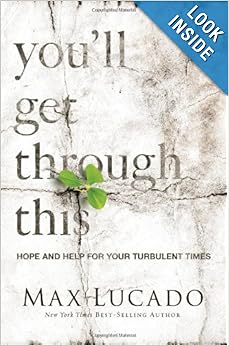
You’ll get through this: Hope and Help for your Turbulent
Times by Max Lucado
I didn’t expect to find so much profound truth in this book
until I started reading. Max’s new book,
entitled You’ll Get Through This, is a real look at the narrative of Joseph’s
life with an eye towards the brokenness and messed up stuff that happens in the
lives of ordinary people. The book is 15
chapters that range from topics like scandals and scoundrels to evil and
revenge. All the elements of a popular
drama movie here yet captured through the eyes of Joseph and our
situation. Max seemingly holds together
the newspaper and the Bible together in one hand throughout this book, only
stepping to add bits of personal stories along the way. Yet, I think the real power of this book is
razor sharp ability of Max to ask the right questions (everyone is thinking),
but offer solid, biblically faithful answers.
Rather than focus overall on the message of the book, I want to bring
out one particular point that Max makes that is crucial to the overall message
of the book.
Chapter 8 is titled ‘is god good when life isn’t,’ an
appropriate title to ask when everyone seems to have the same question. Max sets up the scene by focusing on
particular questions that we ask, namely, “Yet, when God fails to meet our bottom-line
expectations, we are left spinning in a tornado of questions. Is he good at all? Is God angry at me? Stumped? Overworked? …Where is he in all of this (81)? In steps Joseph saying that Just as the seven
years of plenty are decreed of God so are the seven years of famine. God doesn’t create evil but he is sovereign
over all the affairs of men. God permits
things that we think are horrible to happen but his plan does not fail in
bringing good out of it in his own way.
The point that Max makes beautifully is that “we must let God define
good. Our definition includes health,
comfort, and recognition. His
definition? In the case of his Son,
Jesus Christ, the good life consisted of struggles, storms, and death. But God worked it all together for the
greatest of good: his glory and our salvation” (83). If this is a hard pill to swallow, remember
that our limited vantage point and our description of the good often get in the
way of seeing what God is doing in the midst of the terrible. Max also provides examples of real people who
have experienced the loss of children, pain and suffering but who have also
held onto God. If we only make a
contract with God on our terms about being good, then when our fortune collapses
around us we will run from Him. Even
though emotional scars weigh us down, knowing and having a heart knowledge that
God will be with us goes a long way in strengthening our faith and those around
us.
If you have gone through a painful time in your life and can’t
quite come to grips with it, this book will be an encouragement to you. There is some deep riches here as you see how
God went to the depths of suffering for you in the death of his Son in order
that you might have life.
Thanks to BookSneeze and Thomas Nelson for the copy of this
book in exchange for review.
Comments
Post a Comment